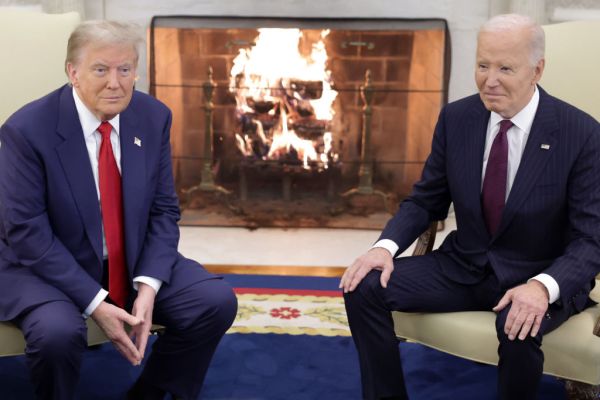Happy Thursday! Yesterday was National Hot Dog Day, which gave Sen. Mitt Romney more than enough reason to roam the halls of Congress wearing a hot dog hat and holding a hot dog while declaring that “hot dog is [his] favorite meat.”
Quick Hits: Today’s Top Stories
- In a memo issued Monday, the Biden administration moved to permanently bar the Wuhan Institute of Virology—the research institute at the center of the COVID-19 lab leak theory—from receiving federal research funding on the grounds the institute failed to comply with National Institutes of Health requests for documents to confirm its safety protocols. The facility—which now has 30 days to respond to the memo or face a longer-term ban—has not received new NIH funding since July 2020. Meanwhile, now-deleted data from a Chinese provincial government website showed cremations rose by 70 percent in the eastern Zhejiang province in the first quarter of this year—coinciding with a COVID-19 surge in the country. The roughly 171,000 cremations cast doubt on China’s official death toll for the entire country since the beginning of the pandemic, which stands at about 83,700.
- The Federal Trade Commission and the Department of Justice proposed new guidelines Wednesday that would raise the level of scrutiny applied to mergers by antitrust officials. The measures, which will have a 60 day public comment period, focus specifically on anticompetitive practices in private equity and technology. They also reflect the aggressive approach taken by FTC Chair Lina Khan, who faced criticism from Republican lawmakers at a House hearing last week after losing several antitrust lawsuits in court recently.
- The global benchmark for wheat prices shot up by 9 percent yesterday after Russia announced that it would consider any commercial ships bound for Ukraine’s Black Sea ports to be legitimate military targets. The announcement followed waves of Russian missile and drone strikes on grain exports infrastructure and other targets in southern Ukrainian port cities on Monday, Tuesday, and Wednesday. Wheat prices already spiked Monday after Russia said it would not renew a wartime deal allowing Ukraine—one of the world’s largest exports of wheat—to continue exporting grain, and recent statements and attacks reflect the Kremlin’s possible willingness to impose a blockade in the Black Sea by force.
- Russian President Vladimir Putin has reportedly decided not to attend a summit of leaders of the BRICS countries—Brazil, Russia, India, China, and South Africa—in Johannesburg next month. The International Criminal Court put out a warrant for Putin’s arrest in March, meaning South Africa—a party to the Rome statute establishing the ICC—would have been legally obliged to arrest him. A spokesman for the South African government said Foreign Minister Sergei Lavrov would represent the Kremlin at the meeting.
- A poorly lit video posted to a Wagner Group-affiliated Telegram channel purports to show the group’s leader, Yevgeny Prigozhin, welcoming his mercenaries to Belarus in what would be his first public appearance since his short-lived mutiny three weeks ago. In the video, Prigozhin seemed to confirm that Wagner had relocated to Belarus after an eleventh-hour deal brokered by Belarusian President Alexander Lukashenko to end the rebellion. The warlord suggested his troops will remain in Belarus—rather than fight in Ukraine—until they “set off on a new journey to Africa,” where the paramilitary group has long been active as an arm of Russia.
- Wesleyan University, a liberal arts college in Connecticut, announced Wednesday it would end legacy admissions, a policy that has come under fire since the Supreme Court struck down Harvard and the University of North Carolina’s race-based admissions policies. In a letter to the Wesleyan community, university President Michael Roth said “legacy status has played a negligible role in our admission process for many years,” but told the New York Times the policy was a “sign of unfairness to the outside world.”
- New Hampshire Gov. Chris Sununu, a Republican, announced Wednesday he will not run for a fifth term as governor. “Public service should never be a career, and the time is right for another Republican to lead our great state,” he wrote in an email to supporters. Following Sununu’s decision, Republican Chuck Morse—former state Senate president—launched his gubernatorial bid, with former U.S. Senator Kelly Ayotte teasing a future run. Manchester Mayor Joyce Craig and New Hampshire Executive Council member Cinde Warmington are already running for the Democratic gubernatorial nomination.
(A)I Approve this Message

Earlier this week, a Ron DeSantis-aligned super PAC released a 30-second ad in Iowa detailing former President Donald Trump’s spat with the state’s popular Republican governor, Kim Reynolds. “I endorsed her, did big rallies, and when she won, now she wants to remain ‘neutral,’” Trump says before a narrator asks why he’s fighting with his fellow Republicans. It’s a fair hit—several GOP strategists in Iowa think it will cost Trump—but there’s just one problem with the ad. Trump never said those words—he Truthed them.
Harnessing the power of artificial intelligence (AI), the DeSantis super PAC Never Back Down was able to generate realistic-sounding audio of Trump reading his own written statement aloud. And it wasn’t the first time. Last month, the DeSantis campaign released a video going after Trump for his refusal to fire Dr. Anthony Fauci during the pandemic—and the spot included fake, AI-generated images of the former president hugging the famous immunologist. When President Joe Biden announced his reelection campaign in April, the Republican National Committee released an AI-generated video depicting several apocalyptic-looking scenes and warning another Biden term would make them a reality. And lest you think this is a purely Republican phenomenon, an audio deepfake released the day before the Chicago mayoral election earlier this year portrayed the less progressive Democratic candidate in the Chicago Mayoral election as condoning police brutality.
This is only the beginning. As the 2024 campaign ramps up, lawmakers and advocacy groups are pushing for the Federal Election Commission (FEC) to make clear that AI campaign ads falsely impersonating candidates violate election law, but some commissioners argue the agency can’t do so without more authority from Congress.
When deepfakes first burst onto the scene a few years ago, they required specific training and skill sets to create. But today, ubiquitous tools like ChatGPT and DALL-E (an AI-image generator) have cut the costs of producing AI content significantly. “There’s a little bit of a filter required when you have to be an expert at Photoshop or a sound engineer,” Michael Frank, a senior fellow for AI and advanced technologies at the Center for Strategic and International Studies, tells TMD. “We have no such filters now,” making the 2024 election “the first one where we have generative AI tools widely available to not just campaigns but the general public.”
Lawmakers, advocacy groups, and federal regulators are racing to catch up. Last month, the FEC considered a petition from progressive advocacy group Public Citizen asking the commission to clarify how the law against “fraudulent misrepresentation” of candidates applies to “deliberately deceptive AI campaign ads.” The commission—split evenly along partisan lines—deadlocked on the question of whether to consider the petition, with Democrats in favor and Republicans opposed. “The only fraud we are entitled to police is where an agent of one candidate pretends to be an agent of another, or where a person raises funds by fraudulently claiming to act on behalf of the campaign with which he or she is unaffiliated,” argued Republican Commissioner Allen Dickerson. “Congress has given us very sharply limited authority.”
Dickerson noted that he and his fellow commissioners have requested that Congress expand said authority—and some Democrats are trying. Sens. Amy Klobuchar, Cory Booker, and Michael Bennet—alongside Democratic Rep. Yvette Clarke in the House—introduced legislation in May that would require political ads that use AI-generated images or video to include a disclaimer. A congressional aide familiar with the bill tells TMD that the disclosure requirements would also apply to super PAC ads. “While it’s critical agencies take action to prevent the use of generative AI to mislead voters and consumers, it’s imperative Congress acts,” Clarke says. And Democratic FEC Commissioner Ellen Weintraub expressed support for the legislation. “More disclosure is almost always better,” she tells TMD. “We could clearly handle [the disclosure requirement] if such a bill were to pass.”
But in the meantime, Weintraub believes there’s still a way for the agency to move forward. “It is true that we have limited jurisdiction under our current statutory authority,” she says. “But I would not want it to preclude us from thinking about creative ways of addressing something.” When asked whether she thought the commission had the authority to act on the petition, Weintraub says she “certainly [doesn’t] think it’s a non-starter.”
Robert Weissman, the president of Public Citizen, argues time is running short to combat AI ad manipulation. “Deepfake technology is pretty good right now and likely to be extremely good before the 2024 election,” he tells TMD. “You don’t need to think too hard to invent nightmare scenarios where deepfake videos or wires or photos dropped shortly before an election are able to swing enough votes to determine an election outcome.” Public Citizen submitted a renewed petition for FEC rulemaking last week, arguing that using an AI-generated fake representation of a candidate is effectively pretending to be the candidate, and therefore, covered under existing FEC rules. “Obviously, [it was] a provision of law before anyone was thinking about deepfakes, but it describes exactly what’s going on with deepfakes,” Weissman adds. He did agree that the FEC’s authority is narrowly tailored, conceding AI ads like the RNC’s likely wouldn’t run afoul of the rules as they don’t “pretend to be Biden.”
And even if the FEC ultimately decides deepfakes are within its authority to police, the rules would only apply to the campaigns themselves and their direct representatives. Barring congressional action, unaffiliated but aligned super PACs, for example, wouldn’t be covered. “The worst actors are most likely to be super PACs and outside organizations,” Weissman says.
Although legislative efforts have thus far been spearheaded by Democrats, plenty of Republicans are concerned by our uncanny valley future, particularly if it disadvantages Trump. The DeSantis ads drew condemnations from Republican lawmakers like Sen. J.D. Vance and Rep. Marjorie Taylor Greene, as well as aspiring lawmakers like Kari Lake, who called for ending the use of AI in campaign ads.
At least one state, Washington, is also working on the issue, becoming the first to regulate the use of AI or “synthetic media” in campaigns earlier this year—Washington’s new law requires clearly visible disclosures on ads that contain “realistic but false” synthetic media.
Yet regulating campaigns’ use of deep fakes and false AI content only touches the tip of the disinformation iceberg. “It’s not going to resolve the broader issue of misinformation and disinformation in elections,” Frank tells TMD. “I’ve had conversations with people working in social media companies, who when they hear all these grand ideas to regulate the flow of misinformation from generative AI, their response is, ‘good luck, we’ve been trying to do this and we don’t see a clear way of doing it.’”
Hunter’s Ears are Burning
Some days, we’re inspired by Congress’ example of democracy in action.
Other days, we watch a six-hour hearing about Hunter Biden complete with lewd posters of the first son—which we won’t be describing in detail, because our moms read this newsletter. Thank you, Rep. Marjorie Taylor Greene.
IRS whistleblower Gary Shapley and his deputy Joseph Ziegler—previously known only as “whistleblower X”—testified under oath before the GOP-led House Committee on Oversight and Accountability yesterday that IRS investigators and Department of Justice officials skirted normal procedure to treat Hunter Biden with inappropriate lenience. The hearing elicited little new information, but the whistleblowers’ claims of wrongdoing provided Republicans an opportunity to draw attention to their allegations of corruption against the Biden family and lay into Attorney General Merrick Garland.
We’ve reported previously on the basic contours of Shapley and Ziegler’s accusations. Both claim higher-ups slow-walked the process, tipped off Hunter’s legal team to developments, and discouraged the IRS team from investigating the possible involvement of Hunter Biden’s family—including Joe Biden and his grandchildren—in the first son’s business dealings. “When the subject’s father is somehow related to the finances of the subject, in the normal course of any investigation, we would have to get that information, to properly vet the financial flows of money, and determine what we end up charging,” Shapley said, claiming that didn’t happen because a DOJ official said it would “get us into hot water.”
This alleged obstruction of the investigation has left outstanding questions, the two IRS officials said. For instance, when investigators dug up an alleged text message from Hunter Biden to a Chinese businessman claiming his father was sitting with him and would hold a grudge unless Hunter got paid, the natural next step would be to check location data to verify whether the former vice president was with his son at the time. The IRS officials said they weren’t allowed to access the location information needed to vet the story.
Hunter reached a deal last month to plead guilty to two misdemeanor tax charges and enter a diversion program (similar to probation) for a felony firearm offense related to his gun ownership as an active drug user. But Shapley and Ziegler argue Hunter should have faced harsher charges—including felony tax charges, not just misdemeanors, in California and Washington, D.C., in addition to Delaware—and that contrary to Garland’s claims, U.S. Attorney David Weiss didn’t have freedom to do so. Shapley alleged Weiss said in an October 2022 meeting that he didn’t have the power to decide whether to file charges outside his jurisdiction in Delaware, a claim both Garland and Weiss deny.
Shapley contested their denials—he claims to have email conversations corroborating his account—but hedged his accusation. “Although these facts contradict Attorney General Garland’s testimony and raise serious questions for you to investigate, I have never claimed to have evidence that Attorney General Garland knowingly lied to Congress,” he said Wednesday.
Ziegler backed Shapley’s description. “It appeared to me, based on what I experienced, that the U.S. attorney in Delaware in our investigation was constantly hamstrung, limited, and marginalized by DOJ officials as well as other U.S. attorneys,” he told lawmakers. Ziegler also alleged he had collected evidence Hunter improperly claimed business deductions for personal expenses, including college tuition, escorts, and a “sex club.”
Democrats on the committee, meanwhile, suggested Hunter’s final plea deal was simply the result of prosecutorial discretion, not wrongdoing. “A lot of your testimony,” argued Rep. Jamie Raskin of Maryland, is about “the traditional tug of war” between investigators and prosecutors, “who are more attuned to the rigors of the courtroom.” Democratic lawmakers also pointed out that Weiss is a Trump appointee—though Trump nominated him on the recommendation of Delaware’s two Democratic senators.
Republicans took special care to burnish the whistleblowers’ credibility and criticize Weiss for his repeated statements disputing the whistleblowers’ narrative about his role in the charging decisions. “The Justice Department can’t get their story straight,” said House Judiciary Committee Chair Jim Jordan. “I’ll believe these guys. I think they’re the ones telling the truth. And that is fundamentally what this comes down to.” Democrats noted they want to hear Weiss’ account of events—he has said he’s willing to testify, though Congress and the DOJ are still negotiating a date.
Republicans used the hours-long hearing to level a number of unrelated accusations against Hunter—Greene at one point accused him of “making pornography”—but the GOP lawmakers underlined to the core point that investigators hadn’t been permitted to find out if the president was caught up in his son’s misdeeds. “He sold access to his father, the big guy,” said Rep. Clay Higgins of Louisiana. “You Americans out there may have a compromised president in your White House. You should certainly be concerned.”
But Democrats also went on the attack during the hearing, questioning whether Jared Kushner and Ivanka Trump engaged in the same kind of influence peddling of which Republicans accuse Hunter. And while Republicans repeated that Shapley and Ziegler are “credible,” Democrats reminded them of Gal Luft, a dual U.S.-Israeli citizen who alleged Hunter had a mole inside the FBI and that the Biden family received payments from Chinese nationals with intelligence ties—before himself being indicted on charges of lobbying without registration, violating sanctions, and brokering arms deals with Iran and China.
Even if Republican lawmakers can’t find enough evidence against Joe Biden to win their game of pin-the-crime-on-the-president, some seem eager to pursue another target: Garland. “Weiss must provide answers to the House Judiciary Committee,” House Speaker Kevin McCarthy tweeted Sunday. “If the whistleblowers’ allegations are true, this will be a significant part of a larger impeachment inquiry into Merrick Garland’s weaponization of DOJ.”
Worth Your Time
- What if race isn’t the stable social grouping we thought it was? For the Washington Post, David Byler examines panel survey data showing that about 8 percent of adults have changed their racial self-identification from one category to another in recent years. He looks into what that might mean for Republican politics. “These studies ask a representative sample of Americans about their views and identities and then contact them again four to eight years later to track how they have changed,” he writes. “On the most basic question of race—‘What racial or ethnic group best describes you?’—many who initially identified as Hispanic, multiracial or ‘other’ changed their answers in the second round. And, in most cases, these switchers moved into the ‘White’ category. For some people, how their identity fits into their community is closely tied to politics. In recent elections, some voters changed their race and their vote at the same time. For example, 59 percent of multiracial Trump converts—that is, mixed-race voters who passed on Mitt Romney in 2012 but voted for Donald Trump in 2016—also switched their race to White. Among multiracial voters who didn’t support Trump or Romney, only 4 percent moved into the White category.”
Presented Without Comment
Politico: New Jersey Man Commuted by Trump Charged in New Fraud Scheme
Toeing the Company Line
- In the newsletters: The Dispatch Politics team dives into Mike Pence’s fundraising woes and Ron DeSantis’ CNN interview, Scott makes the case (🔒) against tariffs, and Nick wonders (🔒) how big a role conservative media has played in DeSantis’ stalled campaign.
- On the podcasts: Jonah is joined on the Remnant by the executive editor of Commentary magazine, Abe Greenwald, to discuss Americans’ penchant for conspiracy theories, those who peddle them, and the state of conservatism today. No Advisory Opinions today, but it will return later this week!
- On the site: Sarah and Mike dig into Trump’s legal strategy, Charlotte breaks down the significance of Russia’s exit from the Black Sea Grain Initiative, and Kevin weighs in on D.C.’s opulent architecture.
Let Us Know
After learning about Shapley and Ziegler’s testimonies before lawmakers, do you find their allegations surrounding the Hunter Biden case more or less credible?











Please note that we at The Dispatch hold ourselves, our work, and our commenters to a higher standard than other places on the internet. We welcome comments that foster genuine debate or discussion—including comments critical of us or our work—but responses that include ad hominem attacks on fellow Dispatch members or are intended to stoke fear and anger may be moderated.
You are currently using a limited time guest pass and do not have access to commenting. Consider subscribing to join the conversation.
With your membership, you only have the ability to comment on The Morning Dispatch articles. Consider upgrading to join the conversation everywhere.